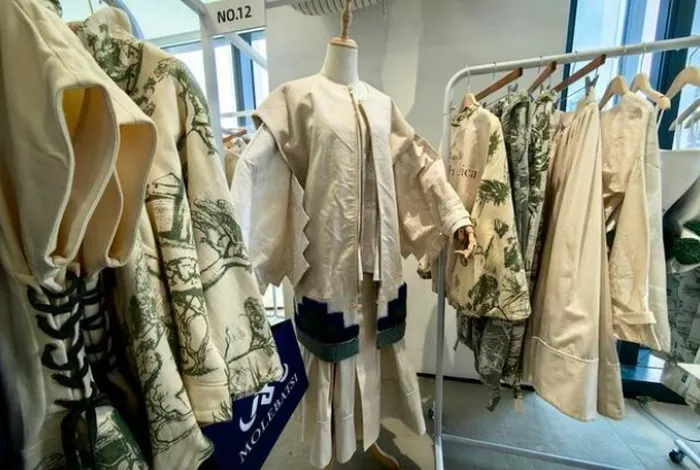At the ongoing 2025 Autumn/Winter Shanghai Fashion Week, 22 African fashion brands have made their highly anticipated debut, setting their sights on breaking into the Chinese and wider Asian markets. The brands are showcasing their unique offerings, ranging from handmade weaving to eco-friendly techniques, underscoring the appeal of China’s burgeoning “debut economy.”
The fashion extravaganza, themed “Innovascape,” took place from March 25 to April 1, featuring nearly 100 runway shows and approximately 1,000 brands in exhibitions. The event provided African designers with the opportunity to connect with global buyers and retailers at the MODE trade exhibition.
Hannah Ryder, CEO of Development Reimagined, led the effort to bring these 22 African designer brands from 12 countries to Shanghai Fashion Week. Ryder highlighted the significance of the debut, emphasizing that African fashion brands are ready to enter the Chinese market. “African designer brands have immense potential in creativity and sustainability, offering something truly unique to the Chinese market,” Ryder said.
Ryder further explained that Shanghai Fashion Week, one of the top fashion weeks globally, presents a platform not just to showcase African creativity but also to establish meaningful connections and expand business cooperation with the Chinese fashion industry. This could also open doors for African designers to reach other markets across Asia, including Southeast Asia, Japan, and South Korea.
While African clothing is often associated with vibrant colors and patterns, Ryder noted that the range of African designer brands extends far beyond this. Some of the brands already have a presence in Europe but are using this exhibition to introduce themselves to China, with plans to launch select collections on Chinese e-commerce platforms for a “test drive.”
A notable creation on display came from the South African brand Molebatsi. Their collection, which blends Chinese-style buckles and double-breasted designs with African geometric patterns, caught attention for its innovation. Fabric adorned with scenes of South African tribes added to the appeal. Co-founder Jessica Jane, who previously visited China, was inspired by traditional Chinese clothing like Hanfu and horse-faced skirts, which she integrated into her designs. “It’s an incredibly exciting opportunity because there are so many collaborations and mutually beneficial relationships between Africa and China,” said her husband and co-founder, Wandile Molebatsi.
Aristide Loua, a designer from Côte d’Ivoire, is new to the Chinese market and has already received cooperation invitations from buyers at Shanghai Fashion Week. He is eager to craft a strategy for entering China based on the feedback received.
Phuti Tsipa, the Consul General of South Africa in Shanghai, praised the event, stating that African designers’ presence at one of the world’s most influential fashion weeks marks a crucial step toward a more inclusive and diverse global fashion industry. Tsipa believes that continued collaboration and investment will help African brands carve out their place in China, not as a niche but as a mainstream force.
Raphael Deray, a buyer from Paris’s Printemps, expressed high expectations for the event, recognizing China’s vast potential as a fashion market. “China has a lot of potential. It is a big market for fashion,” Deray noted, highlighting Shanghai Fashion Week’s role as a hub for international brands looking to engage with the Chinese market.
Tong Jisheng, the director of the Shanghai Fashion Week organizing committee, explained that the event amplifies innovative fashion and helps create a more inclusive approach to global fashion. “We will foster a new fashion ecosystem that spans from Chinese design to global resonance,” he said.
The rise of the “debut economy” in China has significantly influenced consumption patterns, with product launches and new service rollouts becoming key drivers of growth. Liu Min, deputy director of the Shanghai Municipal Commission of Commerce, emphasized that the “debut economy” is crucial for expanding domestic demand and boosting consumption. Shanghai has bolstered policy support, offering exhibition assistance, streamlined customs clearance, and financial incentives to create an optimal environment for global brands to introduce their products.
“We hope more brands will establish a long-term presence in Shanghai, starting with a first launch or debut show, followed by flagship stores, and eventually establishing headquarters here to expand globally,” Liu added.
Related Topics
- Robert Barakett’s T-Shirts Receive Rave Reviews for Comfort and Quality
- REDVANLY Reinvents Golf Apparel with Innovative Design and Signature Men’s Pieces
- Why French Pools Require Men to Wear Tight Trunks This Easter Holiday

